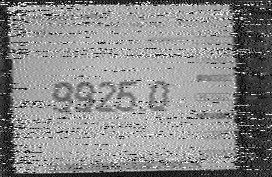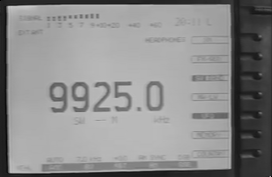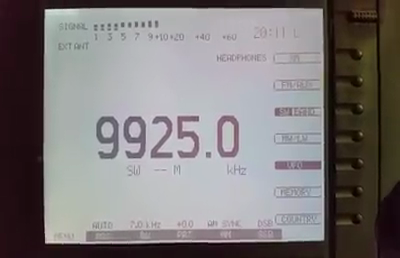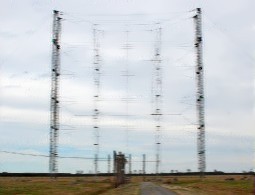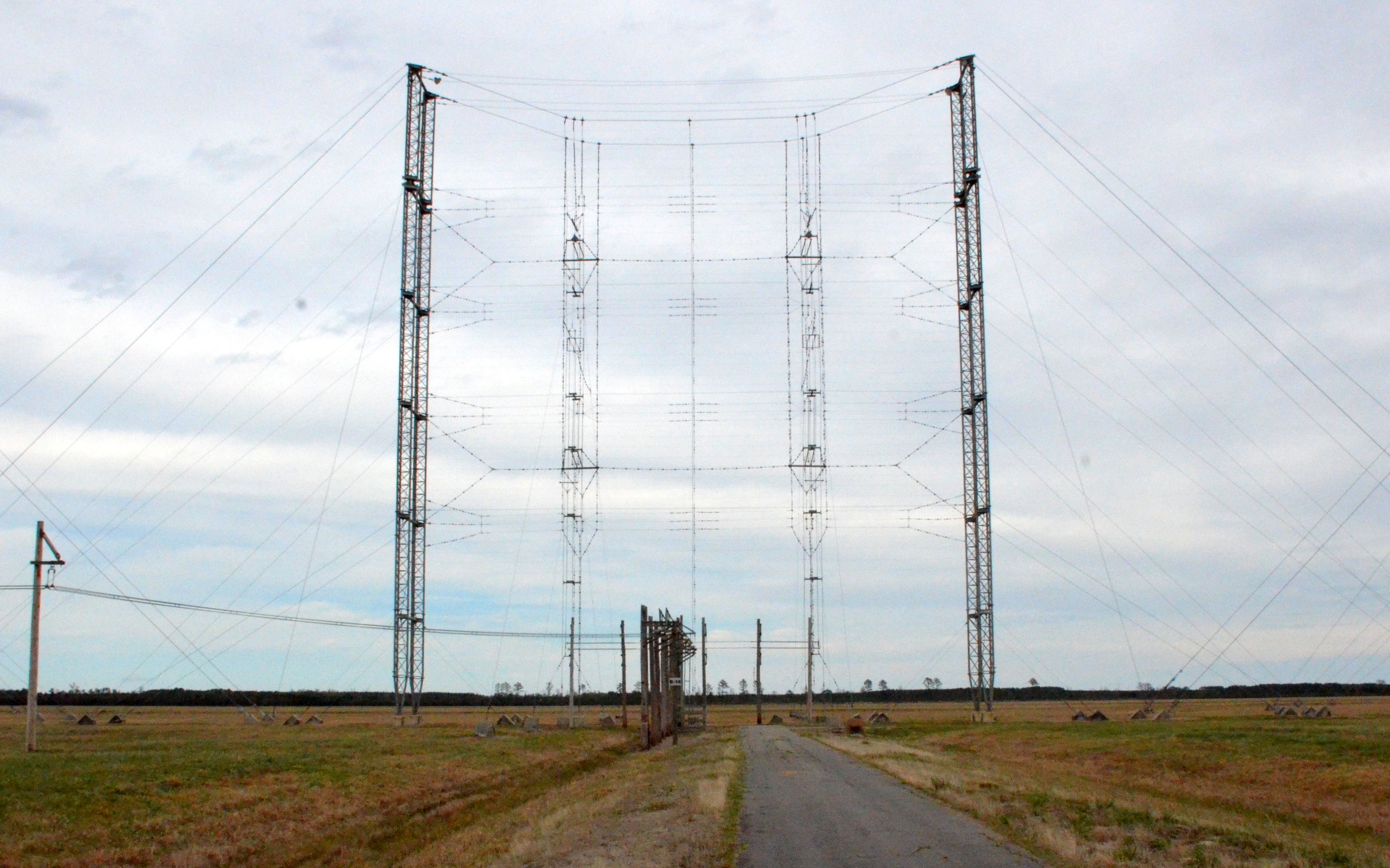www.rhci-online.net/radiogram/radiogram.htm
██████╗ ██╗ ██████╗ ██╗ ██████╗ ██╗ ██╗
██╔══██╗██║██╔════╝ ██║ ██╔══██╗╚██╗██╔╝
██║ ██║██║██║ ███╗██║ ██║ ██║ ╚███╔╝
██║ ██║██║██║ ██║██║ ██║ ██║ ██╔██╗
██████╔╝██║╚██████╔╝██║ ██████╔╝██╔╝ ██╗
╚═════╝ ╚═╝ ╚═════╝ ╚═╝ ╚═════╝ ╚═╝ ╚═╝
RSID: <<2016-05-09T20:00Z
MFSK-32 @ 6070000+1500>>
Hello and welcome to DigiDX 12, a weekly review of the latest shortwave and DX
news broadcast mainly in MFSK32 mode. This broadcast includes shortwave news, an
article on Shortwave radio monitoring by the KGB in Latvia, the over-the-air QSL
card and some of the
listeners emails from the last week.
DigiDX weekly schedule:
Sunday 2130 - 15770kHz via WRMI (Okeechobee, FL, USA)
Sunday 2330 - 11580kHz via WRMI (Okeechobee, FL, USA)
Monday 2000 - 6070kHz via Channel 292 (Rohrbach Wall, DE)
Any changes to this schedule or extra broadcasts will be listed on
http://www.digidx.uk
If you enjoy DigiDX and find the service useful please consider donating via our
Patreon page. Any money donated will go towards paying for airtime to keep
DigiDX on the air to Europe and North America.
Every donation will help no matter how little -
https://www.patreon.com/digidx
Thanks very much to listeners Mike Stapp, Mark Braunstein and Richard Langley
for contributing to the Patreon campaign.
Latest Shortwave News:
Shortwave returns from Yakutia/Sakha in Russia
Another Oromo clandestine station on air
TIVAR hardware test
According to NVK Sakha which is the National Broadcasting Company of the Sakha/Yakutia
region in Eastern Russia, shortwave broadcasting in the region has been
reactivated as of 6th May.
DigiDX previously reporting that licenses had been given by the Russian
communications regulator to the Sakha National Broadcasting Company for
broadcasting on shortwave on 7295kHz and 7345kHz.
To see read the news story (in Russian) and to view news story video on the
reactivation go to http://nvk-online.ru/news/6819
Ivo Ivanov via DXLD has reported the schedule will be as follows:
2100-2400 on 7295 IAK 250 kW / 045 deg to FERu Russian Sun-Thu
2100-2400 on 7345 IAK 100 kW / 310 deg to FERu Russian Sun-Thu
2200-0500 on 7295 IAK 250 kW / 045 deg to FERu Russian Fri/Sat
2200-0500 on 7345 IAK 100 kW / 310 deg to FERu Russian Fri/Sat
0300-0500 on 7295 IAK 250 kW / 045 deg to FERu Russian Mon-Fri
0300-0500 on 7345 IAK 100 kW / 310 deg to FERu Russian Mon-Fri
0900-1200 on 7295 IAK 250 kW / 045 deg to FERu Russian Daily
0900-1200 on 7345 IAK 100 kW / 310 deg to FERu Russian Daily
Another Oromo clandestine station on air
Another clandestine in the Oromo language aimed at Somalia and Ethiopia has
started broadcasting on shortwave via the Issoudun transmitter in France. Radio
Front for Independence of Oromo has been broadcasting for the past few days on
1730-1800 on 17765khz.
An associated website appears to be http://bakkalcha.com/
but there is no
mention of the shortwave broadcasts on the site. Source : Glenn Hauser/DXLD.
Other Oromo clandestine stations currently on air include Voice of Oromo
Liberation, Dimtse Radio Eren, Radio Voice of Independent Oromia, Oromo Voice
Radio and Radio Warra Wangeelaa-ti.
TIVAR Hardware Test
Kim Andrew Elliott from VOA Radiogram has recently been unsure as to why some
people decoding the VOA Radiogram have issues with Olivia 64-2000 modes even
though this mode should be much more robust than MFSK32.
Christopher, K6FIB believes that the performance of decoding Olivia 64-2000 may
be dependant on the processing power of the PC or mobile device. He carried out
a test with the TIVAR Android app and two different android devices. Christopher
says:
“I have been using a Wiko Sunset2 4GB Android smartphone as part of a
lightweight and compact ("hiker biker") portable receiving station for VOA
Radiogram and Digi_DX. However, this device seems unable to demodulate signals
in the Olivia 64-2000 mode when using the
TIVAR app.
To investigate this problem a comparative "shoot-out" test was conducted with
three different Android 4.x.x. devices (one of them being the Wiki Sunset2) all
running the same release of TIVAR, and an MP4 recording of a fragment of VOA
Radiogram broadcast nr. 147
(from my archive).”
View the video and see the results of his testing here -
https://www.youtube.com/watch?v=c_kYz241H6o&feature=youtu.be
Upcoming relays and special broadcasts:
Hobart Radio International has a new broadcast to Europe via WRMI on 11580kHz.
Its full schedule is as follows:
WRMI on 11580 from 2330-0000 Saturday ( Europe, Middle East, North Africa,
N.America)
WRMI 9955 0330-0400UTC Sundays (N.Am/S.Am/India)
WBCQ 5130 0330-0400UTC Mondays (N.Am)
Unique Radio 3210 0800-0900UTC Fridays & Saturdays (N.Aust/PNG)
World FM 88.2MHz 0430UTC-0500UTC Thursdays & 1030UTC-1100UTC Sundays (Tawa, New
Zealand)
Soundwave FM 107.7 and 87.8MHz 0200UTC Sundays (Napier, New Zealand)
Radio Northern Ireland will broadcast live on Channel 292 and WRMI every week in
April at the following times / frequencies:
Monday 9955kHz : 0130-0200 via WRMI
Saturday 15770kHz: 2100-2130 via WRMI
Monday 6070kHz : 1700-1800 via Channel 292
VOA Radiogram will be on air this weekend on the following frequencies, for more
information on the modes to be used visit http://voaradiogram.net/
Sat 0930-1000 5745 kHz
Sat 1600-1630 17580 kHz
Sun 0230-0300 5745 kHz
Sun 1930-2000 15670 kHz
Gilles Létourneau who runs the excellent OfficialSWLchannel channel on Youtube
has another radio related Hangout this week - To watch the hangouts or any of
his videos go to https://www.youtube.com/user/OfficialSWLchannel
Now we have an article from LatvianHistory.com about Shortwave radio monitoring
by the KGB in Latvia written by Maris Goldmanis.
Soon after the end of the World War 2 the tensions between Soviet Union and
United States of America engulfed into Cold War. A full-scale war of propaganda
was used by both side including shortwave radio broadcasts. Shortwave radio
broadcasts could reach listeners to
faraway locations including the Soviet occupied Latvia. Soviet security services
were unable to control the foreign broadcasters so they tried to jam the
broadcasts or to punish the listeners. But in either way it was never-ending
carousel as Soviet radio industry
made shortwave radio receivers in masses and neither the technical jamming or
KGB monitoring could not fully block the western propaganda.
Shortwave radio broadcasts were popular among Latvians because many of them were
critical of the soviet mass media content and therefore they seek alternative
news sources. In first post war years radio was still a rare household item, as
may pre-war Latvian and
German-made radios were lost and Soviets attempted to register the radio owners.
The average shortwave listener needed to know English, German and Russian
although some of their news were transcribed in the national partisan
underground newspapers and leaflets.
However, the circulation of these newspapers were quite low. So radio owners
tried to listen to “Radio London”, “Voice of America”, “Radio Luxembourg” and
“Radio in American Sector”, that transmitted from Western Germany. After the
Winston Churchill “Iron Curtain”
speech in May 24 1946 in Fulton the BBC World Service started broadcasts in
Russian. From September 2 1948 “Radio Vaticana” started broadcasts in Latvian.
Soviet authorities listened and discussed these broadcasts themselves. Since the
content of these broadcasts were beyond their control they started to build
powerful jammers. Their technical operation is discussed in separate post. War
in Korea triggered the
full-scale “campaign of truth” against the communists and decided to boost
nationalism within Soviet occupied Baltic republics. On June 3 1951 the “Voice
of America” begun to broadcast in Latvian. Latvians at first paid large
attention to it, radio played the Anthem
of Latvia and called for resistance making many people to believe that US will
send its support. However, it took place after the deportation of March 25 1949
and Soviet power had fully established itself in Latvia. Later people got enough
of repetitive information
and lack innovation.
Soviet Ministry of Security gathered reports about people listening to “Voice of
America”. Mostly they were discovered when they unknowingly talking about the
broadcasts to a KGB agent or their conversations were overheard. They were added
to KGB list as persons as
spreaders of the “anti-soviet propaganda”. Soviet bureaucrats were even
suggested to stop the production of the shortwave receivers, however it was
turned down by the producers. At the start of the sixties Latvian industrial
companies like VEF and Radiotehnika were
one of the first to produce portable affordable transistor radios in USSR. Radio
was no more a large cabinet like standing in room corner it could be
battery-powered and taken to picnics.
Despite the relative liberalization after the death of Stalin and limitation of
repressions the ideological war with west was far from over. Broadcasts from the
west continued and it was forbidden to publicly spoke about the content heard in
them. Doing so might
result an arrest in “Corner house” of KGB main headquarters in Riga. It was also
no secret that shortwave radio broadcasts inspired many dissidents and no wonder
why many workers in VEF and Radiotehnika became dissidents. Most known of them
were Gunārs Astra. On
September 3 1953 in town of Auce locals streamed the Voice of America within
local radio broadcasting net. They were later arrested.
During the crisis in Hungary on 1956 people were tuned to BBC World Service and
Voice of America. Some young students told they only first learned about
Stalin’s cult of personality from the Voice of America. In Preiļi region people
gathered in groups to listen to
Voice of America. While USSR was reluctant to speak about negative news within
the country the US spent an enormous recourses for anti-communist propaganda.
President of US Richard Nixon told that its much more useful to spent one dollar
on radio propaganda rather
than spend 10 dollars on another new rocket. Another massive radio propaganda
network also broadcasting in Latvian was “Radio Free Europe” that in its r0ots
was a funded by US CIA. It was kept secret until on late seventies KGB funded
leftist magazine uncovered it.
After that Radio Free Europe was funded by US State Congress. Soviet Union also
had shortwave propaganda station “Radio Moscow” that transmitted in various
western languages. Shortwave radio jamming in USSR was halted during diplomatic
warm-ups on 1963-1968 and
1973-1979 both times restarted because of the Soviet invasions in Czechoslovakia
and Afghanistan. Because of relative low numbers of English speakers the
broadcasts in English were not jammed. This is also one of the reasons why in
schools the English studies were
limited.
Radio Free Europe begun its Latvian broadcasts on 1975. KGB foreign branch was
tasked to gather information about the Latvian broadcasting staff and their
editors and tried to infiltrate their agents in them. KGB succeeded to find
information but failed to send
agents to subvert the Latvian editions of VoA and RFE. As the soviet power
weakened on seventies people were less afraid to speak about the things heard on
the radios. KGB still tried to punish some people who were too open, often it
was included into official
accusation that the crime was influenced by the western radio broadcasts. Last
such case was for Rolands Silaraups on 1986 the member of the nationalist
Helsinki-86 movement.
On 1987 in the spirit of perestroika the shortwave jamming was fully halted.
People now closely followed the VoA and RFE. Some of them heard about the first
pro-independence protests on 1987 in the foreign radios and took action on
following ones. On political level
most influential were the Voice of America and Radio Free Europe. On cultural
level the foreign pop and rock music heard by youngsters on their Spīdola radio
receivers also boosted the Latvian cultural life. The banned Latvian movie “Four
White Shirts” included old
conservative party functionary in the censorship meeting talking about the bad
influence on the young generations caused by Spīdola radio receivers.
Today the World Wide Web has replaced shortwave radio as propaganda weapon.
Voice of America no longer broadcasts in Russian or Latvia. Radio Free Europe
however continues to broadcast in Russian and Belarussian over shortwave,
because their local coverage within
medium waves were closed by Russian authorities on 2012. Russia itself has
stripped their Voice of Russia the oldest international radio station from
1920ies when it was called Radio Comintern. But, now the neo-soviet Vladimir
Putin regime has begun a crackdown on
Internet calling it a project of the CIA. In such manner it could be possible
that if Russia will isolate itself from rest of the world, the shortwave
broadcasting to Russia can again became active. There is present example of
China and even more extreme of North
Korea where controlled Internet has caused extensive shortwave broadcast
targeting towards these countries. In return China and North Korea use extensive
shortwave jammers to limit these broadcasts from US and Europe. Will Russia will
return to an old days of
shortwave jamming and arresting their listeners we shall see.
Thank you to Maris Goldmanis from https://latvianhistory.com/
for allowing us to
use that article.
Now follows the e-QSL card for reception reports received for episode 11. This
image will be in the MFSK32 mode.
Sending Pic:332x190;
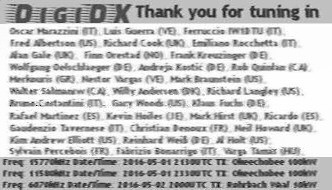
Thank you for all the reception reports sent to
reports@digidx.uk.
Many of you
have correctly identified the MIDI file sent last week as “O Canada” the national
anthem of Canada, part of which was used as the interval signal for Radio Canada
International. The MIDI file
sent the previous week was the interval signal of Voice of Korea.
Richard Langley from Canada but listening on holiday in Florida sent me the O
Canada MIDI file originally and commented “ Both versions of the Base64-encoded
interval signal were perfectly decoded and turned out to be the O Canada midi
file I had sent you a few weeks
ago. ;-) Of course, O Canada is the Canadian national anthem and the first few
notes of a piano rendition were used for the Radio Canada International IS.
Thanks for including it.” Thanks for sending it to me, please send any MIDI
files of interval signals to me at
reports@digidx.uk and I will try and include them in DigiDX.
Mark Hirst from Hampshire in the UK listened on 6070kHz via Channel 292 on
Monday at 2000 and sent the following suggestion:
“VOA Radiogram transmitted data using QR codes, I wondered about sending the QSL
card as a data QR code ? As long as it's not too small, the black and white
shapes come through OK”
Good idea Mark, I will certainly look to give this a go next week to try and
include the some of the details on the e-QSL card encoded as a QR code.
Mark also commented - “The QSL card image was detected but text legibility was
difficult - I wonder if the subtle watermarking of the image is partly to blame”.
This weeks E-QSL card will be transmitted with a solid background to see if that
makes any different to
the text legibility.
Rafael Martínez from Spain also listened to 6070 and commented “Decoding of
Olivia mode was very good despite the noise! Much better than MFSK32, I used the
YB400 receiver tuned on AM mode and wide filter.”. Thanks for tuning in Rafael.
Now DigiDX finishes with the tune of another famous shortwave interval signal.
This text is a Base64 encoded MIDI file (not a .ZIP file this week) which can be
converted to to MP3 by going to http://midi.digidx.uk
(and select the Submit
option) or go to
http://www.motobit.com/util/base64-decoder-encoder.asp
choosing to decode the data and export to file,
the file can then be renamed a .MID file and then the MIDI file can be opened in
Winamp or a similar software.
--START--
TVRoZAAAAAYAAQACAeBNVHJrAAAAIwD/WAQEAhgIAP9RAwrFWgD/WQL/AAD/VAUgAAAAAPoY/y8A
TVRyawAAAuUA/wMcQXJyLjogS29uc3RhbnRpbiBTb2VtZXIgMTk5NwD/BAxQIG9yaWdpbmFsICAA
wTEAsQdjAJE8TACRNS0AkSlOAJEwRADAPACwB3QAsApAAJBFOoMFgEUAaJBFRoNFkTdIE5BDQCGA
RQCDE5E5YguBNwAokEFKD4BDAIMrkTpIBJErYgOBMAAEgTkAEoEpAAmQRkIbgEEAgkWARgB8kEZK
g2CQRVYjgEYAg0SQQ1APgEUAgmWAQwBrkTdGBIE6AAKRLVYEkEhGBoErAAKBNQCDT5BFYhmASACD
B5E1TAqBNwAskEFWBYBFAIQBkEhQB4BBAIFygS0AgQeASAAOkS5CBJE5RlaQSFCDFpE+ToIzkEpW
G4BIAIEukUBcDoE+ADmQRkIdgEoARNEAgjiRPkoDkUFQDIFAAASBPACCPoBGAEuBLgATkSlGBZE3
SgORPGIJgUEABoE+ABiBNQAUgTkAM5BFSoJ7gEUAYZBFUIIpgTcAcJE1RESQQ0gbgEUAg0eQQUwX
gEMAgheBKQBYkTo0BJE3QgWRK0oKgTUAapBGTh2AQQCCMoBGAIEHkEZQg1mQRVYYgEYAg0iQQ0oM
gEUAgmGAQwABgToAApEtaBKBKwBskEhCglWRQVZmkEVQDYBIAIEmgTwAgUSARQAI0QIbkTopA5E+
RgORLjYJgS0ABtEAFYE3AAGQSk6BFdEAgWaBOgAskTk8BpE8UA7ESRSBPgATkEZGFoBKAIImgTwA
A4E5ADPRBBKROjAFkTBIA5E3OgyBLgAa0QYnkENcBYBGAAzRCFTRBirRBH7RAIEPkUBOBJEkSgiB
QQCBf5BBUBGAQwBWgTcAB4BBABuBOgBMkTxIBJE5LwmBJAACkSk+BYEwAAGBQAADkUE6FZBBYoIT
gEEAgUS5B1sAxjAfgSkACIE8AAeUSkoDgUEAAZRNYgGBOQCCRpRMSASURVAFhEoADIRNAHSERQAI
hEwAgW7/LwA=
--END--
Repeat for error correction:
--START--
TVRoZAAAAAYAAQACAeBNVHJrAAAAIwD/WAQEAhgIAP9RAwrFWgD/WQL/AAD/VAUgAAAAAPoY/y8A
TVRyawAAAuUA/wMcQXJyLjogS29uc3RhbnRpbiBTb2VtZXIgMTk5NwD/BAxQIG9yaWdpbmFsICAA
wTEAsQdjAJE8TACRNS0AkSlOAJEwRADAPACwB3QAsApAAJBFOoMFgEUAaJBFRoNFkTdIE5BDQCGA
RQCDE5E5YguBNwAokEFKD4BDAIMrkTpIBJErYgOBMAAEgTkAEoEpAAmQRkIbgEEAgkWARgB8kEZK
g2CQRVYjgEYAg0SQQ1APgEUAgmWAQwBrkTdGBIE6AAKRLVYEkEhGBoErAAKBNQCDT5BFYhmASACD
B5E1TAqBNwAskEFWBYBFAIQBkEhQB4BBAIFygS0AgQeASAAOkS5CBJE5RlaQSFCDFpE+ToIzkEpW
G4BIAIEukUBcDoE+ADmQRkIdgEoARNEAgjiRPkoDkUFQDIFAAASBPACCPoBGAEuBLgATkSlGBZE3
SgORPGIJgUEABoE+ABiBNQAUgTkAM5BFSoJ7gEUAYZBFUIIpgTcAcJE1RESQQ0gbgEUAg0eQQUwX
gEMAgheBKQBYkTo0BJE3QgWRK0oKgTUAapBGTh2AQQCCMoBGAIEHkEZQg1mQRVYYgEYAg0iQQ0oM
gEUAgmGAQwABgToAApEtaBKBKwBskEhCglWRQVZmkEVQDYBIAIEmgTwAgUSARQAI0QIbkTopA5E+
RgORLjYJgS0ABtEAFYE3AAGQSk6BFdEAgWaBOgAskTk8BpE8UA7ESRSBPgATkEZGFoBKAIImgTwA
A4E5ADPRBBKROjAFkTBIA5E3OgyBLgAa0QYnkENcBYBGAAzRCFTRBirRBH7RAIEPkUBOBJEkSgiB
QQCBf5BBUBGAQwBWgTcAB4BBABuBOgBMkTxIBJE5LwmBJAACkSk+BYEwAAGBQAADkUE6FZBBYoIT
gEEAgUS5B1sAxjAfgSkACIE8AAeUSkoDgUEAAZRNYgGBOQCCRpRMSASURVAFhEoADIRNAHSERQAI
hEwAgW7/LwA=
--END--
Thank you for listening, this is DigiDX signing off......
██╗ ██╗██████╗ ██████╗ ██████╗ █████╗ ██████╗ ██╗ ██████╗ ██████╗ ██████╗ █████╗ ███╗ ███╗
██║ ██╔╝██╔══██╗██╔════╝ ██╔══██╗██╔══██╗██╔══██╗██║██╔═══██╗██╔════╝ ██╔══██╗██╔══██╗████╗ ████║
█████╔╝ ██████╔╝██║ ██████╔╝███████║██║ ██║██║██║ ██║██║ ███╗██████╔╝███████║██╔████╔██║
██╔═██╗ ██╔══██╗██║ ██╔══██╗██╔══██║██║ ██║██║██║ ██║██║ ██║██╔══██╗██╔══██║██║╚██╔╝██║
██║ ██╗██████╔╝╚██████╗ ██║ ██║██║ ██║██████╔╝██║╚██████╔╝╚██████╔╝██║ ██║██║ ██║██║ ╚═╝ ██║
╚═╝ ╚═╝╚═════╝ ╚═════╝ ╚═╝ ╚═╝╚═╝ ╚═╝╚═════╝ ╚═╝ ╚═════╝ ╚═════╝ ╚═╝ ╚═╝╚═╝ ╚═╝╚═╝ ╚═╝
|
http://www.kbcradio.eu/
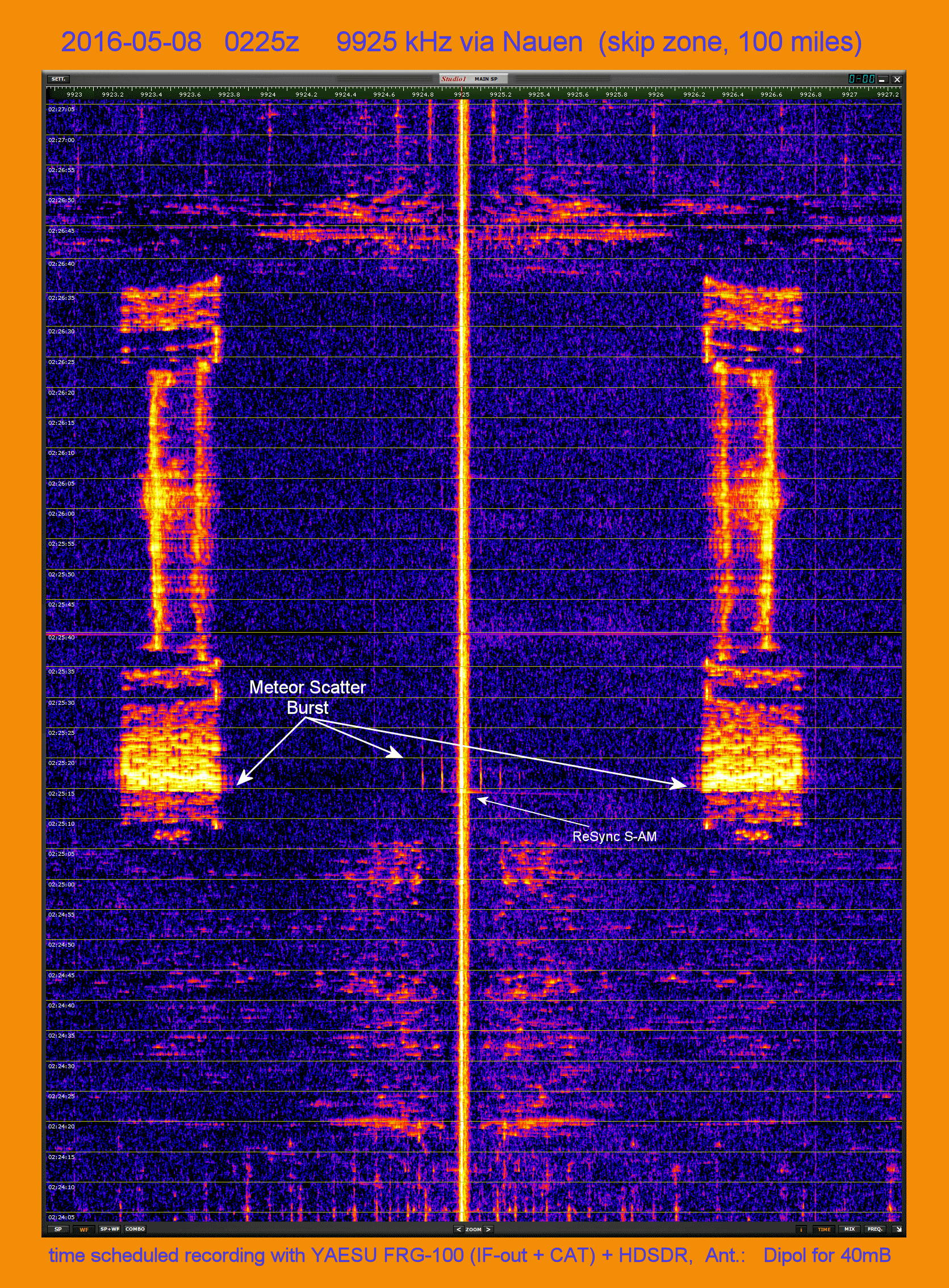
RSID:
<<2016-05-08T02:25Z
MFSK-32 @
9925000+1500>>
Facebook.com/TheMightyKBC
has great videos of listeners'
reception on the new 9925 kHz frequency.
This screen capture is from James in northern Minnesota, using an
Etón E1 XM ...
Please report decode to
themightykbc@gmail.com
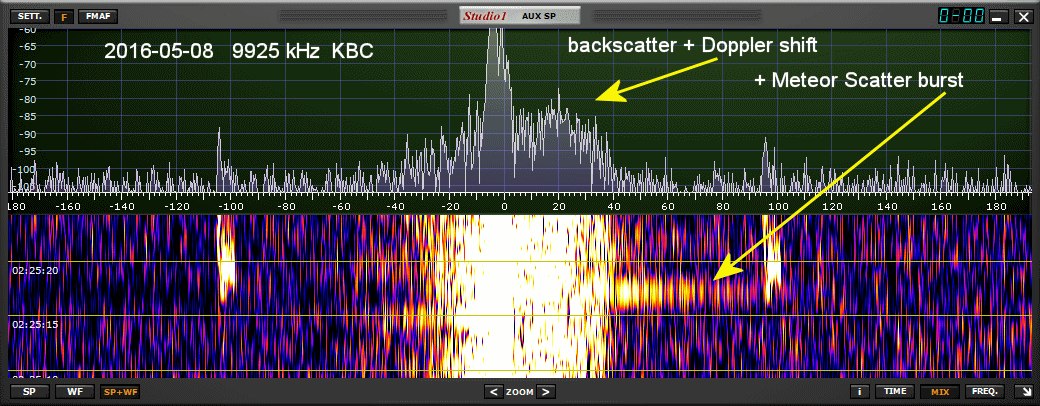
██╗ ██╗ ██████╗ █████╗ ██████╗ █████╗ ██████╗ ██╗ ██████╗ ██████╗ ██████╗ █████╗ ███╗ ███╗
██║ ██║██╔═══██╗██╔══██╗ ██╔══██╗██╔══██╗██╔══██╗██║██╔═══██╗██╔════╝ ██╔══██╗██╔══██╗████╗ ████║
██║ ██║██║ ██║███████║ ██████╔╝███████║██║ ██║██║██║ ██║██║ ███╗██████╔╝███████║██╔████╔██║
╚██╗ ██╔╝██║ ██║██╔══██║ ██╔══██╗██╔══██║██║ ██║██║██║ ██║██║ ██║██╔══██╗██╔══██║██║╚██╔╝██║
╚████╔╝ ╚██████╔╝██║ ██║ ██║ ██║██║ ██║██████╔╝██║╚██████╔╝╚██████╔╝██║ ██║██║ ██║██║ ╚═╝ ██║
╚═══╝ ╚═════╝ ╚═╝ ╚═╝ ╚═╝ ╚═╝╚═╝ ╚═╝╚═════╝ ╚═╝ ╚═════╝ ╚═════╝ ╚═╝ ╚═╝╚═╝ ╚═╝╚═╝ ╚═╝
http://voaradiogram.net/
RSID: <<2016-05-07T16:01Z
MFSK-32 @ 17580000+1500>>
Welcome to program 162 of VOA Radiogram from the Voice of America.
I'm Kim Andrew Elliott in Washington.
Here is the lineup for today's program, all in MFKS32 except where noted:
1:34 Program preview (now)
2:41 Rubbish-burning experiment in Norway*
7:55 Olivia 64-2000: UAE may make mountain to
change climate*
18:34 MFSK32: FCC considers change to amateur data regulations*
23:37 Closing announcements*
* with image
Please send reception reports to radiogram@voanews.com.
And visit voaradiogram.net.
Twitter: @VOARadiogram
VOA NEWS
Rubbish-Burning Experiment Captures Destructive Greenhouse Gases
Deborah Block
May 04, 2016
The firey blazes at Oslo, Norway's main Klemetsrud incinerator
burn a huge amount of residential and commercial waste each
day—stuff that can't be recycled. The energy that is generated is
used for the heating and electricity of Oslo's buildings, said
Johnny Stuen, the Technical Director for the incinerator.
But the waste-to-energy plant is also Norway's largest source of
man-made greenhouse gas emissions, about 6 percent each year.
And those gases harm the environment by contributing to global
warming, which in turn, can lead to drought, floods and
increasing sea levels.
So in an effort to create a cleaner environment, Norway undertook
the world's first major test to capture environmentally harmful
carbon greenhouse gases from the fumes of burning rubbish.
During the recent five-month trial, five containers fed exhaust
gases through a series of pipes and filters, keeping up to 90
percent of those gasses out of the air, explained Oscar Graff of
Aker Solutions, a Norwegian oil services company that oversaw the
test. He was pleased that the carbon dioxide was "easy to
capture" and there was no problem with the process.
There are about 700 waste-to-energy plants worldwide but
technology for carbon capture and storage is expensive. Oslo's
project was funded by Norway's state enterprise for developing
carbon capture and storage.
And with the success at Klemstsrud, Norway is considering
building a full-scale carbon capture plant by 2020, where the
gases could be shipped to the North Sea and injected into oil and
gas fields to increase production.
http://www.voanews.com/content/major-rubbish-burning-experiment-captures-destructive-greenhouse-gases/3314721.html
Image: Firey blazes at Oslo, Norway's main Klemetsrud incinerator
burn a huge amount of residential and commercial waste daily ...
Sending Pic:224x162C;
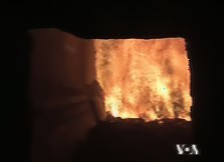
VOA Radiogram now changes to Olivia 64-2000 ...
RSID: <<2016-05-07T16:07Z
OL 64-2K @ 17580000+1500>>
This is VOA Radiogram in Olivia 64-2000.
Please send reception reports to radiogram@voanews.com..
VOA NEWS
Can Artificial Mountain Change Microclimate?
George Putic, KI4FNF
May 03, 2016
Most scientists believe than our planet is getting hotter and
drier and that the trend will be hard to reverse, especially in
flat regions such as the Arabian Peninsula.
Among other reasons these regions do not have much rainfall is a
lack of so-called updraft — vertical movement of the moist air
that occurs when horizontal winds hit a mountainside.
So one Persian Gulf nation, the United Arab Emirates, is
seriously considering building a mountain to try to change its
climate.
While it does not have experience in mountain-building, the UAE
has successfully built an artificial lake — Lake Zakher, in the
desert near the border with Oman.
Scientists from the U.S.-based University Corporation for
Atmospheric Research say they are now studying local climatology
to determine the best location for and dimensions of the proposed
mountain.
If the project materializes, moist air from the Gulf could climb
up the mountainside and cool, while seeding the clouds from
aircraft with eco-friendly chemicals would help create much
needed rain, changing the local climate.
bit.ly/24wkIrG
VOA Radiogram returns to MFSK32 ...
RSID: <<2016-05-07T16:15Z
MFSK-32 @ 17580000+1500>>
This is VOA Radiogram in MFSK32.
Please send reception reports to radiogram@voanews.com.
Image: The sun sets in the Rub' al-Khali desert, which
encompasses most of the southern third of the Arabian Peninsula
...
Sending Pic:230x162C;
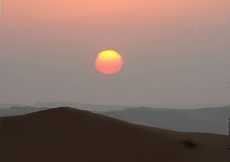
This is VOA Radiogram from the Voice of America.
Please send reception reports to radiogram@voanews.com.
From ARRL, the U.S, national association for amateur radio:
FCC Action Anticipated on ARRL's "Symbol Rate" Petition for Rule
Making
05/03/2016
The FCC [U.S. Federal Communications Commission] has put "on
circulation" its decision on the ARRL's Petition for Rule Making
(RM-11708), seeking to change the Amateur Service Part 97 rules
to delete the symbol rate limit in §97.307(f) and replace it with
a maximum bandwidth for data emissions of 2.8 kHz on amateur
frequencies below 29.7 MHz. Proceedings on circulation are
pending action by the full Commission, although there is a
current backlog, and FCC action is not likely in the near future.
ARRL General Counsel Chris Imlay, W3KD, said the League has
remained patient.
"While we had hoped for more responsive handling, it is
understood that the large number of comments from radio amateurs
on the Petition took some time to sort out," he said. "It was
good to note that the Wireless Telecommunications Bureau has
circulated a draft of what we presume to be a Notice of Proposed
Rule Making responsive to our Petition to the Commissioners for
their consideration. We hope to see the proposal released soon."
In its petition, the League asserted that the changes proposed
would "relieve the Amateur Service of outdated, 1980s-era
restrictions that presently hamper or preclude Amateur Radio
experimentation with modern high frequency (HF) and other data
transmission protocols" and would "permit greater flexibility in
the choice of data emissions."
Symbol rate represents the number of times per second that a
change of state occurs, not to be confused with data (or bit)
rate. Current FCC rules limit digital data emissions below 28 MHz
to 300 baud, and between 28.0 and 28.3 MHz to 1200 baud.
"Transmission protocols are available and in active use in other
radio services in which the symbol rate exceeds the present
limitations set forth in §97.307(f) of the Commission's Rules,
but the necessary bandwidths of those protocols are within the
bandwidth of a typical HF single sideband channel (3 kHz)," the
ARRL pointed out in its 2013 petition. At one point, the League's
petition topped the FCC's list of "Most Active Proceedings,"
attracting hundreds of comments.
Full text, including news about the new 2200 and 630 meter
amateur radio bands ...
http://www.arrl.org/news/fcc-action-anticipated-on-arrl-s-symbol-rate-petition-for-rule-making
Image: FCC logo ...
Sending Pic:235x215;

Please send reception reports to radiogram@voanews.com.
And visit voaradiogram.net.
Twitter: @VOARadiogram
Thanks to colleagues at the Edward R. Murrow shortwave
transmitting station in North Carolina.
I'm Kim Elliott. Please join us for the next VOA Radiogram.
This is VOA, the Voice of America.
Thomas Witherspoon recently took some excellent photos of the
Edward R. Murrow station, which are posted here:
http://swling.com/blog/2016/04/edward-r-murrow-shortwave-transmitting-station-wallpaper-images/
Sending Pic:316x28C;

RSID: <<2016-05-07T16:28Z
OL 64-2K @ 17580000+1500>>
VOA Radiogram transmission schedule
(days/times UTC):
Sat 0930-1000 5745 kHz
Sat 1600-1630 17580 kHz
Sun 0230-0300 5745 kHz
Sun 1930-2000 15670 kHz
All via North Carolina
www.rhci-online.net/radiogram/radiogram.htm


